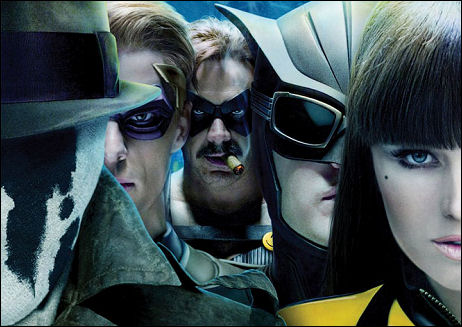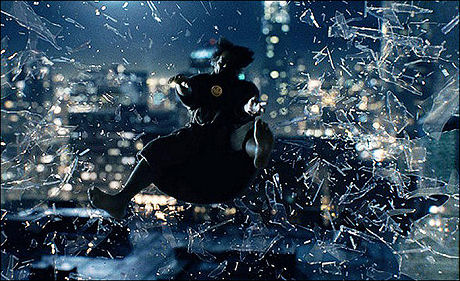If the New Yorker‘s Anthony Lane doesn’t like a film, he’ll disdain it to death. He never gets worked up, not really, although every so often he’ll allow a current of profound disgust to seep into his prose. Which is why, for me, this just-posted Watchmen pan is such a kick-and-a-half. Lane hates it! He’s all but vomiting on the sidewalk.

“The world of the graphic novel is a curious one,” he begins. “For every masterwork, such as Persepolis or Maus, there seem to be shelves of cod mythology and rainy dystopias, patrolled by rock-jawed heroes and their melon-breasted sidekicks. Fans of the stuff are masonically loyal, prickling with a defensiveness and an ardor that not even Wagnerians can match.
“The bad news about Watchmen is that it grinds and squelches on for two and a half hours, like a major operation. The good news is that you don’t have to stay past the opening credit sequence — easily the highlight of the film. In contrast to all that follows, it tells its tale briskly, showing how a bunch of crime-fighters formed a secret club known as the Minutemen, who in turn were succeeded by the Watchmen. This entails a whisk through history from the nineteen-forties to the eighties, with shots of masked figures shaking hands with John F. Kennedy, posing with Andy Warhol, and so forth; these are staged like Annie Leibovitz setups, and, indeed, just to ram home the in-joke, we later see a Leibovitz look-alike behind a camera.
“But must we have ‘The Times They Are A-Changin’ in the background? How long did it take the producers to arrive at that imaginative choice? And was Dylan happy to lend his name to a project from which all tenderness has been excised, and which prefers to paint mankind as a bevy of brutes?
“Watchmen, like V for Vendetta, harbors ambitions of political satire, and, to be fair, it should meet the needs of any leering nineteen-year-old who believes that America is ruled by the military-industrial complex, and whose deepest fear — deeper even than that of meeting a woman who requests intelligent conversation — is that the Warren Commission may have been right all along.

“The problem is that [director Zack] Snyder, following original author Alan Moore, is so insanely aroused by the look of vengeance, and by the stylized application of physical power, that the film ends up twice as fascistic as the forces it wishes to lampoon. The result is perfectly calibrated for its target group: nobody over twenty-five could take any joy from the savagery that is fleshed out onscreen, just as nobody under eighteen should be allowed to witness it.
“You want to see Rorschach swing a meat cleaver repeatedly into the skull of a pedophile, and two dogs wrestle over the leg bone of his young victim? Go ahead. You want to see the attempted rape of a superwoman, her bright latex costume cast aside and her head banged against the baize of a pool table? The assault is there in Moore’s book, one panel of which homes in on the blood that leaps from her punched mouth, but the pool table is Snyder’s own embroidery.
“You want to hear Moore’s attempt at urban jeremiad? ‘This awful city, it screams like an abattoir full of retarded children.’ That line from the book may be meant as a punky retread of James Ellroy, but it sounds to me like a writer trying much, much too hard; either way, it makes it directly into the movie, as one of Rorschach’s voice-overs. (And still the adaptation won’t be slavish enough for some.)
“Amid these pompous grabs at horror, neither author nor director has much grasp of what genuine, unhyped suffering might be like, or what pity should attend it; they are too busy fussing over the fate of the human race — a sure sign of metaphysical vulgarity — to be bothered with lesser plights. In the end, with a gaping pit where New York used to be, most of the surviving Watchmen agree that the loss of the Eastern Seaboard was a small price to pay for global peace.
“Incoherent, overblown, and grimy with misogyny, Watchmen marks the final demolition of the comic strip.”
But please, read the whole thing.
